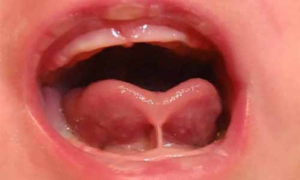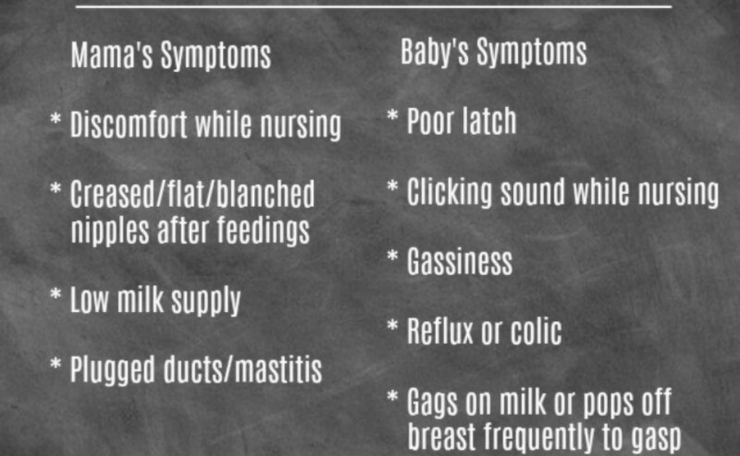“Tongue-tie” has been a buzz word in some circles and is still quite unknown in others. Tongue-tie is a congenital condition in which the lingual (tongue) or labial (lip) frenulum is too tight causing restrictions in movement that can cause significant difficulty with breastfeeding and in some instances, other health concerns like dental, digestive and speech issues.
Parents often want to know what some typical signs of tongue/lip tie are. Issues can present differently for everyone. Some common symptoms that may point to the infant being tongue/lip  tied include: poor latch, inability to latch, sliding off the nipple, fatigue during feeds, sleepy feeds, poor weight gain, clicking during a feed, maternal nipple pain/damage, increased maternal nipple/breast infections, compromised milk supply, dribbling milk at the breast/bottle, digestive issues and various other feeding challenges. It is important for your provider to be able to provide you with those that can evaluate and treat oral restrictions like tongue and lip tie. A IBCLC may be able to help connect you with additional resources and providers that can treat a tongue or lip tie.
tied include: poor latch, inability to latch, sliding off the nipple, fatigue during feeds, sleepy feeds, poor weight gain, clicking during a feed, maternal nipple pain/damage, increased maternal nipple/breast infections, compromised milk supply, dribbling milk at the breast/bottle, digestive issues and various other feeding challenges. It is important for your provider to be able to provide you with those that can evaluate and treat oral restrictions like tongue and lip tie. A IBCLC may be able to help connect you with additional resources and providers that can treat a tongue or lip tie.
If you are unsure whether or not your provider is adept at assessing or treating various types of tongue and lip tie you may want to ask your provider the following questions:
- How do you assess for tongue/lip tie?
- How often do you treat tongue/lip tie in your practice?
- Do you treat posterior tongue ties?
- How do you perform the procedure?
- What type of follow-up care do you recommend after the procedure?
Providers that routinely assess and treat babies for tongue and lip tie should be able to easily answer these questions and provide parents with enough information that they can make an informed decision. Parents should always feel empowered to see additional opinions and advocate for the needs of their child if they are struggling to find a provider that understands and treats oral restrictions.





